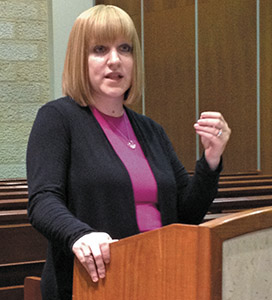
What happens when a woman stops having children?
This rarely discussed intimate subject was the focus of a shiur given by Yoetzet Halacha Nechama Price on “What to Expect After You Are Done Expecting: From Birth Control to Menopause.”
Held May 5 at the Synagogue of the Suburban Torah Center in Livingston, the shiur concluded a year-long series by Price that attracted 200 women in the Essex County area. The shiurim rotated among four local Orthodox synagogues: Ahavas Achim B’nai Jacob & David and Ohr Torah in West Orange and Livingston’s Etz Chaim and Synagogue of the Suburban Torah Center. Previous shiurim addressed the topics of In the Bedroom and Beyond: Your Questions Answered, Intimacy Behind Closed Doors and 10 Mistakes Keeping You From the Mikvah.
The position of Yoetzet Halacha, or female adviser in Jewish law, was created in 1997 by Nishmat: The Jeanie Schottenstein Center for Advanced Torah Study for Women in Jerusalem. Over the course of an intensive two-year program, students are trained in the halachic intricacies of taharat hamishpacha (family purity laws). Price, who is only the second Yoetzet Halacha in New Jersey, graduated in 2013 as part of the first US cohort.
“The series came about because there were several women in the West Orange and Livingston communities who felt it would be nice to have a resource specifically focused on issues of taharat hamishpacha,” said Dara Orbach and Cheryl Munk, who helped coordinate bringing Nechama Price to the area. “It’s such a personal area of our lives, and so many women don’t ask questions when they have them because they feel shy or embarrassed.
“We hoped to change that little by little with Nechama’s help. Since we’ve started the program, we have heard stories of women who have recently started using the mikvah for the first time in their lives. We’re thrilled Nechama has had such a positive influence in our communities and has been able to help so many women, and we look forward to our continuing relationship,” they added.
“I believe that the work of a Yoetzet Halacha is essential to women in every community. It is important that every woman feels comfortable in asking questions and seeking help in the realm of the laws of family purity, fertility and intimacy,” explained Price. “The Yoetzet Halacha works together with the shul rabbi to ensure the best way to help the women of their community. I am privileged to be a part of so many communities in New Jersey and encourage all women to ask their questions and seek out help in these areas of halacha whether to your rabbi or your Yoetzet.”
Price has been on the faculty at Stern College in the Bible and Judaic Studies departments since 2004. Prior to that, she completed the Stern College Graduate Program for Advanced Talmud Studies, received her Masters in Jewish Education from Azrieli Graduate School, and Masters in Bible from Bernard Revel Graduate School. In addition to Livingston and West Orange, she serves as a Yoetzet in the communities of Englewood, Tenafly, Long Branch and Georgetown, Washington, DC. Price is also the Director of Yeshiva University’s Graduate Program in Advanced Talmudic Studies. She lives in Bergenfield with her husband and four children.
Price began the shiur by stating “It’s a blessing to have children.” Eventually, though, every woman reaches the post-childbearing years. “And then we come to the time where you are done, you are done having children,” she said. “And it’s a new stage in life. It is a stage of raising your children, possibly going on more vacations (which evoked a gale of laughter among the audience), possibly getting to hang out with your husband a little bit more, sleeping through the night…We become grandparents, a whole different stage of life.”
Noting how important it is for women to know the halachas of the post-childbearing years, Price utilized an extensive source sheet to discuss three different aspects of this stage in life. The evening concluded with a question-and-answer period.
Price invites women who have questions about intimate issues to contact her at asknechama@gmail.com. Information about next year’s series is available by emailing Cheryl Munk at cherylmunk@yahoo.com.
By Sherry S. Kirschenbaum










